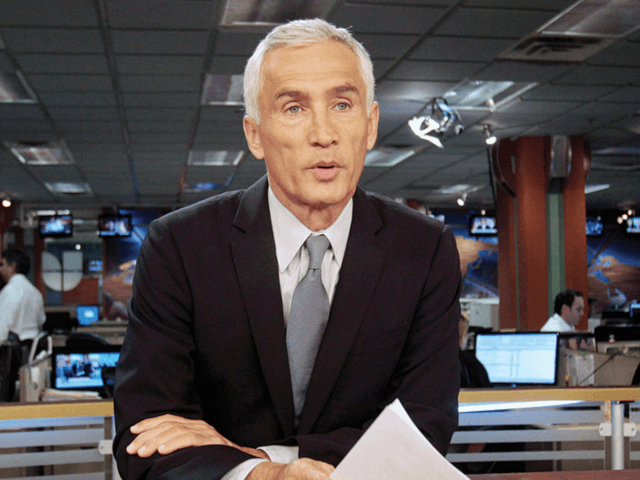Univisión announced Thursday it had recovered the full video of a lost interview by Jorge Ramos with Venezuelan dictator Nicolás Maduro that Maduro abruptly ended before confiscating the tape and detaining Ramos.
The interview occurred in February, a month after Maduro’s legal term as Venezuela’s president expired and the National Assembly appointed Juan Guaidó the nation’s interim president. Maduro has rejected Guaidó’s claim, locked himself in Caracas’ Miraflores palace, and deployed the military to repress Guaidó’s street protests.
In quotes from the interview released by Univisión, Ramos brings up Maduro’s illegitimacy to the leader’s face, unsettling him. He later presents Maduro with a list of hundreds of political prisoners in Venezuela and shows him a video of his people eating garbage to survive before Maduro ends the interview.
In the official announcement of the recovery of the tape, Ramos says that anonymous sources within Maduro’s government retrieved the tape and handed it back to Univisión. Ramos had his mobile phone and his team had the tapes confiscated before being detained and ultimately deported.
In the short video Univisión published of the interview, Ramos asks Maduro to explain why he is comfortable detaining prisoners of conscience in the country.
“Venezuela does not have prisoners based on their ideology,” Maduro responds, before Ramos hands over a list of “more than 400 political prisoners.”
“Take your little garbage and take it away, comrade,” Maduro responds, shooing away the list with his hands.
“This is not garbage, these are political prisoners, these are human beings,” Ramos responds as Maduro speaks over him. Ramos then begins reading a list of civilians killed by Maduro’s forces, starting with 17-year-old Neomar Lander.
At the time of the interview, Ramos’ number of political prisoners was accurate, but since the rise of Guaidó and widespread national protests calling for Maduro to step aside, that number has risen to 797 people, most civilians and at least one minor, according to the Venezuelan Penal Forum NGO. Most are kept in the Helicoide, a former shopping mall that has become the regime’s central torture facility for political dissidents, according to prisoners who survived being kept inside.
Maduro goes on to call Ramos “not a journalist,” a “provocateur,” “part of the right-wing opposition,” and threaten him: “You came here to provoke me; you are going to swallow your provocation with Coca-Cola.”
Ramos can be clearly heard in the video asking him about the hundreds of Venezuelans dead at the hands of socialist security forces and telling him, “the dead are your fault.”
In other excerpted transcripts from the interview, Ramos opens the exchange by asking Maduro what to call him. “You know, you are not the legitimate president. So what do I call you? For them [the opposition] you are a dictator,” Ramos says.
“I only have one name,” Maduro replies wryly.
According to Univisión, Maduro hurled “half a dozen threats and insults” at Ramos throughout the entire tape. At one point, the socialist dictator advises, “you have to be more balanced.”
“You have a position against the Bolivarian Revolution. You are a right-wing opposition member who lives in the United States, very anti-revolutionary,” Maduro tells Ramos. “You are not just a journalist, Jorge.”
The description of Ramos as “right-wing” will confuse many in the United States who consider Ramos a left-wing figure due to his defense of Latin American immigrants and criticism of President Donald Trump. Despite taking center-left stances in American politics, Ramos has been a vocal critic of both Maduro and of the Cuban communist regime that controls Venezuela.
Univisión has not aired or teased the conclusion of the interview, though Ramos described it at the time of his deportation from Venezuela.
“I showed him a video I recorded on my cell phone of some kids eating garbage out of a truck,” Ramos said in February. “And the interview ended there. He got up, tried to cover up the images on my iPad and left. I told him that that is what dictators do.”
Thousands of Venezuelans rely on eating garbage to survive. Under late dictator Hugo Chávez and later Maduro, the country implemented socialist economic policies, nationalizing farms and distributors and giving them to their political cronies to control, rather than those experienced in growing and selling food. The result has been one of the world’s most tragic humanitarian crises. Even those with full ration cards often cannot find a supermarket with food, leaving them to scavenge for food in the trash. Those lucky enough to find something valuable in the garbage sell it, creating a black market for garbage.
Ramos expressed shocked at his detention following his release.
“I never thought that Maduro would, first of all, walk out of an interview, and then detain us for more than two hours,” he said upon returning home to Miami.
The full 17-minute exchange between the two will air on Univisión at 7:00 p.m. Eastern time Sunday.

COMMENTS
Please let us know if you're having issues with commenting.